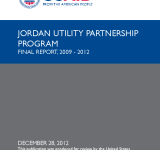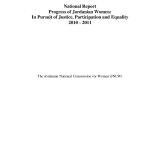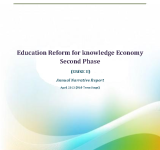This publication aims to summarize and assess the results of the United States Energy Association (USEA)’s Jordan Energy Partnership Project (JUPP);; funded by the USAID. The JUPP is part of the USEA/USAID Energy Utility Partnership Program (EUPP);; which assists developing countries with increasing environmentally sustainable energy production and use and improving the operational efficiency and increased financial viability of their utilities and related institutions. The JUPP focuses on improving the technical and operational efficiency of Jordan’s electric utilities and electric grid. Defining energy insecurity as one of the most significant problems in Jordan;; the report summarizes the program’s activities and assesses their results and impacts. It looks at multiple aspects including the utility participant training and female participation. The results of the publication are increasing system efficiency;; developing customer energy efficiency programs;; increasing corporate efficiency;; supporting capacity building;; reducing electricity losses and power outages;; improving transmission dispatch center operations;; enhancing worker productivity through safety and interconnecting renewable energy and distributed generation. The report concludes with key lessons learned from the projects.


